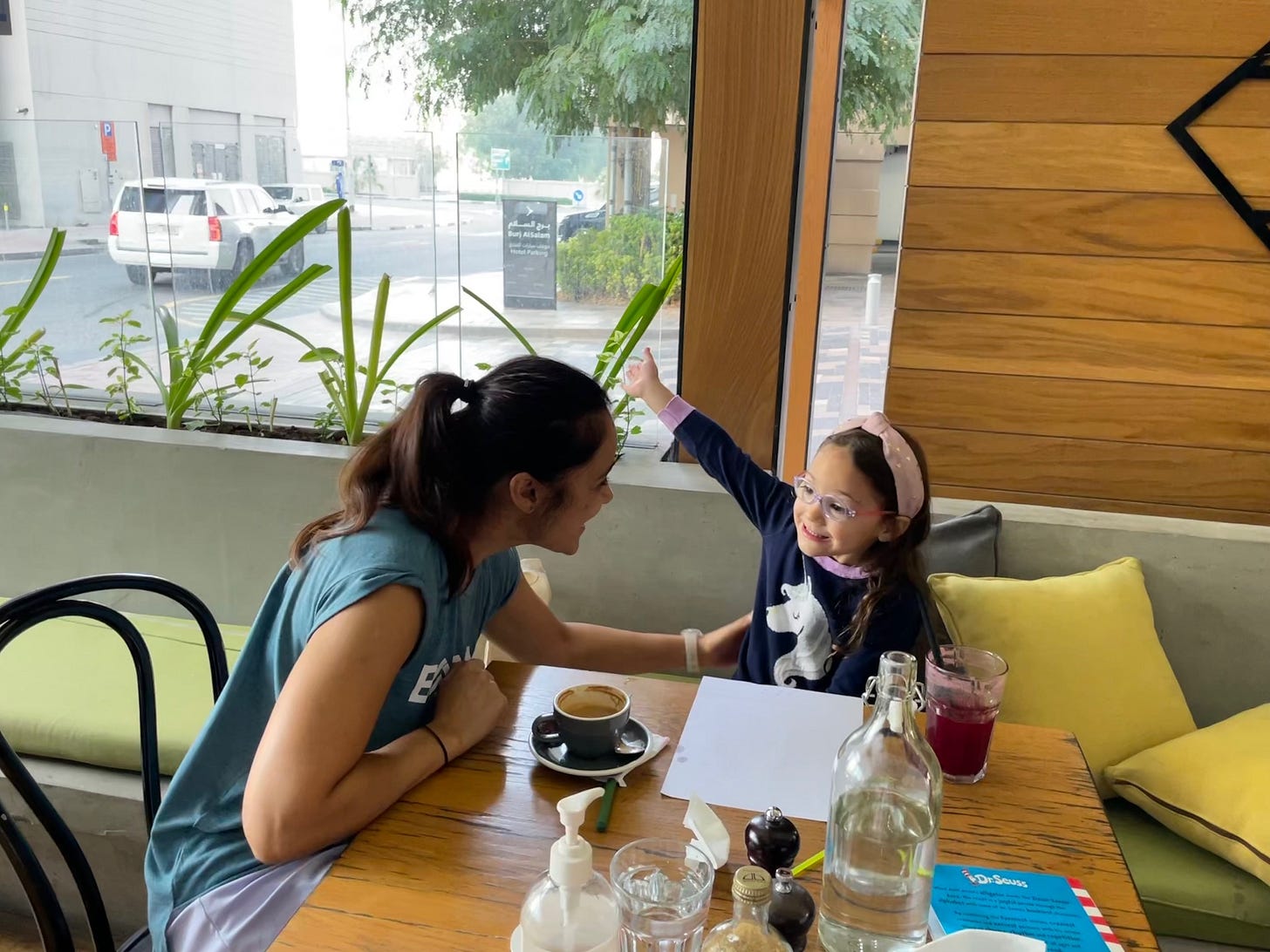How to talk to your child about disabilities
Awareness, conversation and small actions can go a long way
I have had 2 incidents lately that I have not known how to handle.
The first one was at my daughter’s swimming lesson. My daughter saw a girl, about the same age as her, with only one hand. She called out to her and said innocently, “hey, what happened to your hand?” The girl ran away.
Later on my daughter asked me what happened to that girl’s hand, to which all I could say was that I didn’t know and that I hoped she was okay.
I often think of this situation and what is the best way to handle it. No doubt a similar situation will confront us again. I needed to talk to Gulshan aunty*.
*Gulshan Karavana is founder of Special Family Support (SFS) group in Dubai and a dear friend of our family. She started SFS back in 1999 when she was seeking support herself as her daughter Zara was diagnosed with Dravet syndrome, a rare type of epilepsy that starts in the first year of your baby’s life. Children with Dravet syndrome have a wide range of seizure types and severity. They also have other symptoms including developmental setbacks, speech and language problems, and balance and walking issues.
What started as a small support group in Gulshan Aunty’s living room, now supports at least 500 families in Dubai. Having a child or family member with special needs can be very isolating. The group brings families with members who have special needs to share their hopes, strengths, and challenges.
—
“You could have asked Ria if she wants to go and say hi to the girl,” Gulshan aunty suggested when I asked her what I could’ve done. “And then what if Ria asks her about her arm?” I asked. “That’s okay. It would be up to the girl to answer or not,” said aunty.
This is not something I would have thought of doing.
The second incident was when I caught up with a friend, whose son (about 8 years old) is on the autism spectrum. Being in an unfamiliar environment made him uncomfortable, making him scream dramatically when we met. This frightened my kids, and me and to be honest; and I had no clue how to handle the situation, let alone my kids in the situation. All was fine after a while, and the kids played well together.
Later my daughter asked me, ‘Why was he screaming like that?’ ‘Did I do something wrong?’ ‘Why was he upset?’, again answers I didn’t have.
“You can tell your child about autism," explained Gulshan aunty. "If they can say dinosaur they can say autism. And you say a ‘child with autism’ or ‘a child on the autism spectrum’, not “autistic child” so you refer to the child first,” explained aunty. “You can also explain things like sensory overload; tell them too many aspects of a new environment can be difficult for some children to handle.” Short answers are enough.
How do you talk to your children about children with disabilities?
“You know, we teach our children about different dinosaurs. Dinosaurs with scales; with long necks; with long tails; with horns. We teach them everything about these extinct animals that they will only ever see in the form of a skeleton in some museum. But we don't teach them about children who are different from them. Why is that?”
When thought of like that, it does feel absurd that we do not talk enough to our kids about disabilities.
Gulshan aunty gave me some ideas on how we can explain it: “You can show your kids a box of chocolates. Show them all the types of chocolate and tell them they are different but they are all still chocolate. Or show them your fingers on your hand - they are all different, but all are fingers and all as important."
Reading books with characters who have disabilities is another way to talk about it with your child. Sesame Street books have a character Julia who has autism and they are really good to read. Their Youtube Channel also has some good clips to watch that help you discuss this with your children.
How do you talk to a mum or parent who has a child with a disability?
Here are some tips from Gulshan aunty:
Never say you are sorry about their child having a disability. Sorry is what you say when a child is dead.
“Unfortunately it is not uncommon for doctors to break the news to parents by saying we're so sorry but your child is never going to grow up to be anything. Your child will never be able to read, write or walk.” says Gulshan aunty.
Include them like you would any other mum or parent. Ask them how they are, what they are struggling with. They do not want your pity. It’s okay to ask them about their child, or to ask them if they want to talk about their child.
If you see a parent in a supermarket and they are struggling with a child that is clearly having a meltdown (not a trantrum), offer to help the parent, they will most likely welcome your support.
If you or your child go to an event where there are children with special needs, enjoy the event like you would any other event. Your children will feed off your comfort and also enjoy themselves.
If you know someone with a child with disabilities, invite them with their child, to your child's parties. It will make a world of a difference to the child with disabilities and to his family, and your child will learn to accept children with differences as they are.
When my brother first went to volunteer at SFS, Gulshan aunty asked him, why are you here? “I’m here to help”, he said. “Then you can leave, we don’t need your help," said aunty. Anish was confused. “They don’t need your help. Help means you are superior. You are here to be a friend. You are likely to learn more from them than the other way around," she then explained. You can read about his experience here.
What do you do if you and your child see a child in a wheelchair?
It is common for us and our kids to look away, or stare at other adults or children with disabilities. Rather than doing that, smile at them. Feel free to go up and say hi!
When this happens to Gulshan aunty, she doesn’t shy from offering to explain why her daughter (now in her 20’s) is in a wheelchair. She knows the parents are unlikely to know how to explain the situation to their kids. “I tell them, there are lots of wires in our brains. Some people’s wires don’t connect. Zara’s wires don’t connect, that’s why she can’t speak. She can walk but not for long, so she needs to sit which is why she is in a wheelchair. There is nothing wrong with Zara and she can say hello to you and you can say hello to her.”
I have only scratched the surface of this topic. I hope you found it as useful as I did as a starting point.
If you are a mum with a child who has a disability, and have anything to add or share about this topic, please leave a comment or reply to this email, I would love to hear from you.
If you are mum who has any more questions about this topic, please leave the question in the comments, I will find the best answers I can, and come back to you.
If you are in Dubai and you want to know more about SFS, you can join their Facebook group here. Everyone is welcome to all their events. The last one I went to we were given a lesson in sign language. I highly recommend them and take your kids.
If you know anyone who might benefit from this article, please share it!
All for now,
Love
Abha





